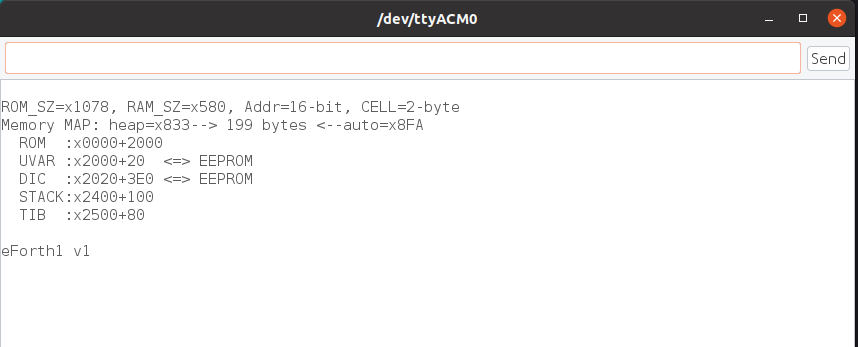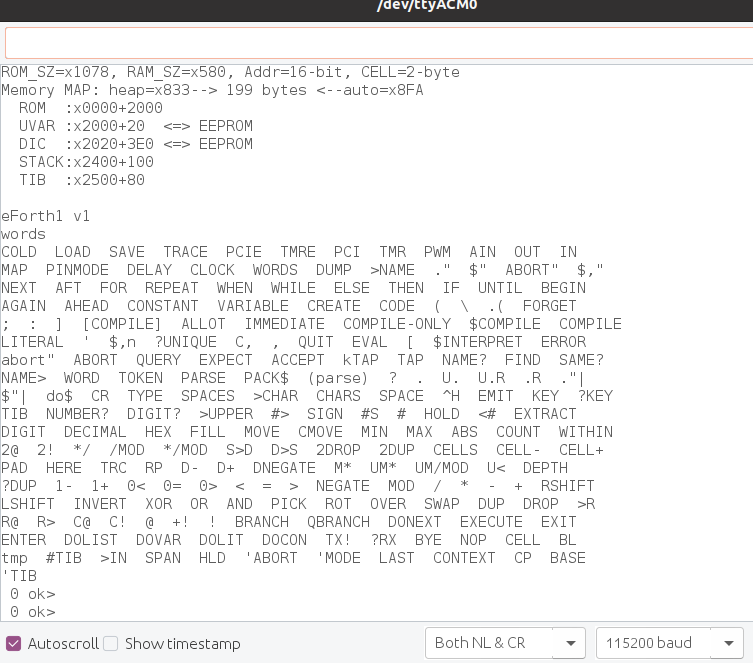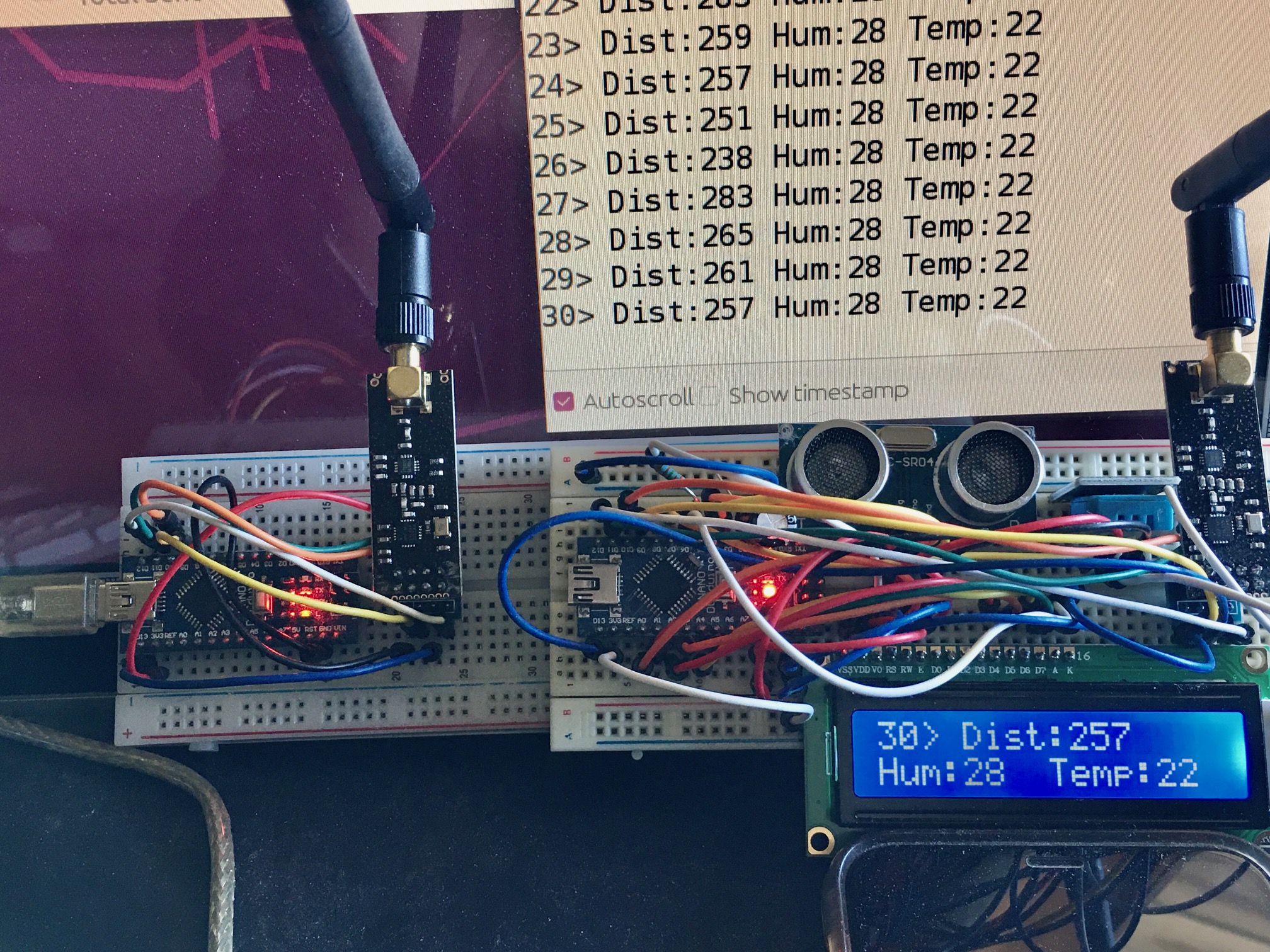Dr. Chen-Hanson Ting, the name often associated with eForth and one of the inspiring figures of Forth community, wrote:
In all these years, I have thought that the eForth Model is a good model useful for all different processors and microcontrollers, and for all different applications. It is a very simple model for anybody who like to learn Forth and to use it for their own applications.
In 2011, Dr. Ting created 328eForth to run Forth on Arduino UNO and wrote in his ceForth_33 document:
I was attracted to Arduino Uno Kit and ported eForth to it as 328eForth...writing to flash memory, I had to take over the bootload section which was monopolized by Arduino IDE...I extended Forth dictionary in the RAM memory. It worked. ...., it was only a teaser to entice new people to try Forth on Arduino Uno.
Personnally, I enjoyed the beauty of working on something small and simple, so decided to pick up Dr. Ting's eForth Model to push it beyond being a teaser. Here we go...
- An eForth for Arduino UNO/Nano implemented in C.
- .ino sketch file can be openned in Arduino IDE, no programmer to overwrite bootloader needed.
- Has 16-bit cells and stacks.
- Can read/write Arduino GPIO pins.
- Supports Arduino Timer and Pin Change Interrupts.
- Has C API to interface with user defined functions written in .ino.
- Can save/restore app to/from EEPROM.
- Can be embeded with other Arduino applications.
- Can become a turnkey system booting from saved EEPROM or enscripted Forth code.
-
From Arduino IDE's Library Manager
Make sure you've hooked up one of Arduino Nano/Uno, or a development board that hosts ATmega328
> from Arduino IDE > Tools > Manage Libraries, enter FORTH in search box
> find eForth1 in the short list, select the latest version, and click the Install button
> from Files > Examples, find eForth1 in Examples from Custom Libraries at very buttom section
> load one of the eForth1 examples, such as 0_hello
> open Serial Monitor, set baud rate to 115200, and line ending to Both NL & CR
> hit compile and upload. You should see the 'ok' prompt
-
Or, from GitHub directly, if you prefer managing source codes manually
> git clone https://github.com/chochain/eForth1 onto your local Sketch directory
> copy examples/0_hello/0_hello.ino from sub-directory, then rename it as eforth1.ino
> open eforth1.ino with Arduino IDE, and setup your Nano/Uno (or ATmega328) development board
> in eforth1.ino, change the #include <eforth1.h> to #include "./src/eforth1.h"
> open Serial Monitor, set baud rate to 115200, and line ending to Both NL & CR
> compile and upload, you should see the 'ok' prompt
Hopefully, thing goes well and you get something like the snip below if eForth1 is uploaded successfully.
Now type WORDS in the input bar and hit <return> to list all the words supprted by eForth1. It is ready to serve your future fun projects.
- Instead of the original 32-bit, CELL is 16-bit, and prmitives are 8-bit opcodes.
- To save space, primitives are compiled as bytecode and composite words are flagged address pointers.
- For speed, use direct threading model instead of original subroutine threaded,
- Instead of raw GPIO port read/write, eForth1 calls Arduino library functions i.g. PINMODE = pinMode, IN = digitalRead, OUT = digitalWrite, ...
- Support multi-tasking. Timer2 sliced at 1ms as the heart-beat with 8 ISR handler slots provided which Forth words can be assigned to. Timer1 is left free for Servo or other libraries.
- Support Delay (sleep). It does not pause the MCU nor does it interfer with interrupts. 16-bit delay max 32767ms, longer delay can be have by defining word that loops.
- Support Pin Change Interrupts. ISR handler slots are provided for each of Port B,C, and D.
- Support 32-bit clock (in ms). It takes 2 cells off 16-bit stack. Arithmetics for double are also provided. DNEGATE, D+, or D- plus the conversion words D>S, S>D.
-
LED blinker (assume you have a blue LED on pin 6, or try this Wokwi project)
> 1 6 PINMODE⏎ \ set pin 6 for OUTPUT, i.e. pinMode(6, OUTPUT=1) > : blue 6 IN 1 XOR 6 OUT ;⏎ \ create a word to toggle the blue LED > : blink FOR blue 500 DELAY NEXT ;⏎ \ create a word to blink (i.e. 500ms delay) > 9 blink⏎ \ run 10 cycles (i.e. 9,8,7,...,2,1,0 to on/off 5 times)
-
Timer Interrupt Service Routine (a red LED on pin 5)
> 1 5 PINMODE⏎ \ set pin 5 for OUTPUT > : red 5 IN 1 XOR 5 OUT ;⏎ \ create an interrupt service routine (just a regular word) > ' red 200 0 TMISR⏎ \ make the ISR ticked every 0.2 seconds (= 200ms) > 1 TIMER⏎ \ enable timer, now you should see red LED blinking continuously > 19 blink⏎ \ let's have them both blink (blue LED 10 times)
Blinker Interrupt Service -
Drives 8 Servos. Demo at this Wokwi project
-
Controls 4-legged Robot (8 servos) with ultrasound and IR remote. Demo code in ~/examples/8_kame
Ultrasound Ranging Walking -
Bluetooth (HC-05) communication. Demo code in ~/examples/9_bluetooth
-
WiFi (nRF24L01s) communication. Demo code in ~/examples/11_rf
- Classic 1 million cycles
> : inner 999 FOR 34 DROP NEXT ;⏎ \ inner loop (put 34 on stack then drop it) > : outer 999 FOR inner NEXT ;⏎ \ create the outer loop > : bench CLOCK DNEGATE outer CLOCK D+ ;⏎ \ CLOCK returns a double value > bench⏎ \ benchmark the 1000x1000 cycles > 25492 0 ok> \ 25492ms =~ 25.5us/cycle (with one blinking ISR running in the background)
If your programming language exposure has been with C, Java, or even Python so far, FORTH is quite different. Quote Nick: "It's no functional or object oriented, it doesn't have type-checking, and it basically has zero syntax". No syntax? So, anyway, before you dive right into the deep-end, here's a good online materials.
- Interactive tutorial for FORTH primer. It teaches you how FORTH fundamentally works such as the numbers, the stack, and the dictionary.
Easy Forth Tutorial by Nick Morgan with a Writeup by Juergen Pintaske.
To understand the philosophy of FORTH, excellent online e-books are here free for you.
- Timeless classic for the history, paths, and thoughts behind FORTH language.
Traditionally, the Forth image is build from low-level assembly and high-level Forth via a process called meta-compilation. See details here. Latest eForth, from Dr. Ting, changed the process to build the entire image with C only. I follow the same philosophy.
> git clone https://github.com/chochain/eForth1 onto your local directory
> make rom # to create src/eforth_rom.c
study how src/eforth_asm.h, and src/eforth_asm.c create Forth image
study how vm_outer() in src/eforth_vm.cpp interacts with the ROM image
modify src/eforth_asm.c to build your version of eForth
> make # to generate tests/eforth1 for debugging, or
use Arduino IDE to compile and upload
- Check your Arduino IDE installed directory, say C:\Users\myname\AppData\Local\Arduino... on Windows or /home/myname/Arduino/... on Linux,
- Find the directory hardware -> arduino -> avr,
- With an editor, open the 'platform.txt' file,
- Find all three -Os compiler options (i.g. compiler.c.flags=-c -g -Os ...)
change them to -O3 for speed, -Os (default) for smallest size, -O2 for somewhere in-between
- eForth and Zen
- The Arduino controlled by eForth
- 328eForth mod for coinForth by D. Ruffer
- ceForth_33.doc - original documentation
- ceForth_33.cpp - source code in C
- eforth_328.ino - Arduino IDE teaser by Dr. Ting
- A tiny 8-bit sytem at eForth for STM8 or STM8 Programming
- A system with WiFi, and fancy stuffs at Esp32forth or its GitHub site






